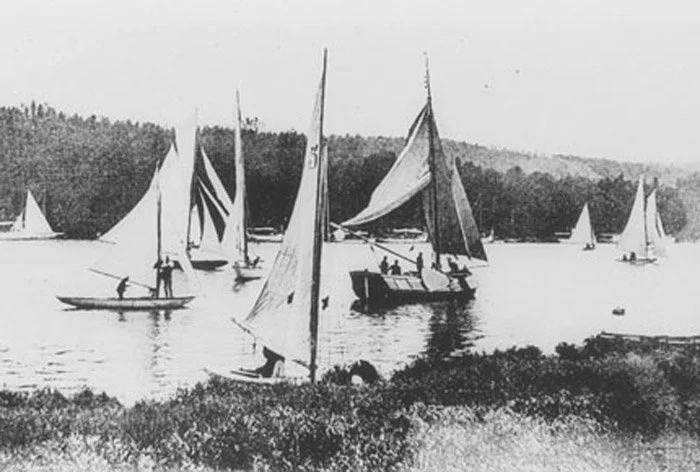Olympic Opinions
Sailing made its first appearance at the Olympic Games in 1900 (it was supposed to be introduced at the 1896 Olympics but was called off due to bad weather). It took place on the River Seine, 32km away from the centre of Paris.
You might legitimately ask what a wooden boat website is doing opining on the Olympic sailing event? Well, we like to think that we bear witness not only to the world of wooden craft but also the values around sailing in general. The paragraphs below are taken from main stream(ish) media this week, sailing or otherwise. And like it or not… these are the views coming out of Marseille.
By Jonathan Liew in The Guardian August 13 2024
How many of you own a boat? How many of you could get access to a boat and – checks notes – a sea to sail it in? Of all the many anachronisms at the modern Olympics, sailing is perhaps the most conspicuous of all: a continuing sop to super-rich men who founded the Games and still just really love yachts, basically inaccessible to most of the countries in the world, even the ones with a viable coastline.
But socio-demographics is actually not the biggest issue here. For an event whose defining motif is bringing people together in a place to celebrate sport, sailing is basically extraneous to the whole thing: marooned hundreds of miles away in some well-heeled harbour, basically unwatchable as a spectator sport, liable to be postponed if there is either no wind or too much wind, and with a set of penalty rules indecipherable to all but the most avid boat people, which as we’ve established, you are almost certainly not.
By Anarchist David in Sailing Anarchy August 9th 2024
You have to wonder if there’s anything more that World Sailing and the IOC can do to further devalue sailing as an Olympic sport.
For decades we’ve been told that the primary aim of ‘updating’ Olympic sailing was to make it more inclusive, more appealing to youth, and more exciting for television. Instead, the 2024 regatta has, with few exceptions, scored poorly on all three of those objectives. Admittedly, the weather was dismal, but the problems ran much deeper than a simple lack of wind.
Take nothing away from the athletes themselves. Where the events in Marseille were conducted in fair breezes, in genuinely popular boats and under sensible scoring rules the acknowledged champions usually did well. But elsewhere some fine sailors who spent years developing their skills were denied medals they probably deserved.
The conventional regatta formats we all know, where races are scored equally with few drops, evolved over many years to reward consistency and reduce the element of luck which can be such a disruptive factor in competitive sailing.
But rather than accept those established principles and concentrate on making Olympic sailing fair and relevant the governing authorities have let the tail wag the dog. By straining to create events they imagine might be more attractive to youth and television, the IOC and World Sailing distorted both the range of classes and the formats they race under.
Those of us with an affection for sailing history have long deplored the ‘Medal Race’ concept which scores double points for no apparent reason other than the hope that this contrived finale might make the event more exciting. If the last race scores double, why not the first?
If that isn’t bad enough, we now have knock-out quarter and semi-finals and ludicrous one-off, winner-take-all, three-way sprints to decide winners.
The UK woman who won the qualifying series in the foiling windsurfer class by a 30-point margin (and under any normal scoring system would be assured of the gold medal) was relegated to bronze after coming third in that final ‘showdown’ race – which lasted all of 7 minutes and 28 seconds. It apparently does not concern World Sailing that the general public found this patently unfair.
Nor have the frequent changes of class helped. Mixed two-handed offshore racing was to be a medal event at Marseille, only to be abandoned when the practical issues proved insurmountable. The continuing lack of a keelboat class effectively excludes any skipper over 30. Back in 1964 the gold medallist in the 5.5 meters was 59 years old (and enjoyed a couple of stiff double scotches before every race).
The revered Finn was dropped, purportedly on the basis that it unfairly favored larger sailors. Yet the winner in the iQFoil class, already a big man, happily admitted to stacking on an extra 20kg (44lbs) of body weight just to make himself more competitive.
Meanwhile, when will the IOC realize that Olympic sailing isn’t a mainstream television sport? If it were, then the racing would feature ‘live’ in prime time on free-to-air TV. Instead, we’re lucky to get 30-second highlight packages often broadcast hours – if not days – after the events. That is not an entrenched network prejudice against the sport. It is simply a commercial priority decision based on professional assessments of audience appeal. Sailors understand and enjoy the racing but the rest of the world is bemused – or bored.
As to the ideological goal of ‘inclusion’, what the IOC and World Sailing never admit is that the sport, at Olympic level, is anything but inclusive. It is, in truth, elitist. Very few sailors from Second or Third-World nations get to represent their countries. Why? Because the costs are prohibitive and their opportunities for top-level participation are limited.
Even the poorest African nations continue to produce champion distance runners because their talented youngsters can compete for the price of a pair of track shoes. Likewise, sprinters from the tiny island nations of the Caribbean can aspire to be the next Usain Bolt. But the cost of a foiling Nacra is beyond them, let alone the required four-year outlays on coaching, equipment, clothing, and travel to the mandatory qualifying regattas.
To underline that point, here’s the list of sailing gold medal-winning nations from Marseille: Italy (2), Spain, Israel, Slovakia, Netherlands (2), Australia, Great Britain and Austria. Not many ‘developing’ countries among that lot.
Finally, there is the much broader issue of whether sailing should be in the Olympics at all.
A sport that relies so heavily on complex equipment with moving parts, and the luck of variable conditions, already has a weak claim to the “Faster, Higher, Stronger” ideals of the Games. The sad spectacle of some kite-boarders managing to get their kites to fly while other entrants – through no fault of their own – didn’t have enough breeze to even start sailing proved the inherent potential for unfairness when extreme classes meet unstable weather.
Mind you, if the IOC can adopt break dancing as an Olympic sport, then kiteboarding looks almost legitimate.
By Alexander Smith of Reuters August 12, 2024
The wind or lack thereof was a challenge for Olympic sailors, officials, and broadcasters. However, the tight racing led to a change in the sailing world as foiling became a standard. The Netherlands won two golds, two bronzes, and Italy and Austria each took two golds. Britain, the team that must be beaten, only managed to win gold and bronze. Marit Bouwmeester, the Dutch dinghy demon, helped them dominate and became the most successful woman in Olympic sailing.
The sport's governing body also highlighted the success of smaller countries. Peru won bronze in men's sailing dinghy. World Sailing CEO David Graham said, "We know that what we are doing with the Emerging Nations Programme works. It's time to enhance this." Israel won gold and silver in windsurfing, Cyprus men’s dinghy, and Slovenia men’s kiteboarding. Kiteboarding, billed as the fastest Olympic sports, made a splash. Fans were fascinated by foiling board 'flying above the water' and dramatic high-speed crashes. The speed of the sport also changed how races were run. Jurors now use drones to monitor a new breed of personalities.
Los Angeles will likely have 10 events with the same format, but technological advances are likely to bring about further changes. Graham stated that World Sailing closely monitored SailGP developments in officiating, broadcasting and Olympic sailing to "see what can be transferred into Olympic sailing".
Graham stated that World Sailing will review the format of windsurfing in Marseille.
He said that a working group was in place to develop the format. "I'm certain the formats will be refined before Los Angeles," he added, referring to the differences between the kiteboarding and the windsurfing events at the current Games.
Although the number of spectators in Marseille was not as large as in Paris, Graham expressed optimism about the future.
"Our Olympic class has a buoyant atmosphere and there are some really exciting developments with equipment... I'm optimistic and think the sport is in a great place.
By Alistair Skinner writing in Eurosail News, August 14 2024
I have to take issue with the statement in the World Sailing summary that says , “it's hard to argue with who won the 30 medals across 10 events.”
In the women’s Windsurfing the sailor who scored 8 x 1; 2 x 2; and 2 x 3 didn’t win the gold medal. It went to the sailor who’s best score in the fleet racing was 2 x 3; 5 x 4. Even the WS article right after the one 3 board race victory stated that sailor “gets” the gold medal. Note NOT “won” the gold medal.
I don’t know whether it was the decision of World Sailing to further mess (first for TV change was of course the medal races) with a decades proven scoring system for just the windsurfer classes or if their strings were being pulled by the IOC.
Either way, the best and most consistent sailor (across all the classes) in the regatta did not walk away with the biggest prize as they should have which is the whole point of our sport’s tried and tested scoring system. There was not one race where they did not score a podium finish, something none of the gold medallists achieved. It was a domination reminiscent of Rodney Pattisson in Acapulco.
One of the biggest stages in our sport is NOT where one should try out experimental made for media initiatives. Someone needs their cages rattled!
Add your thoughts on the games below!

